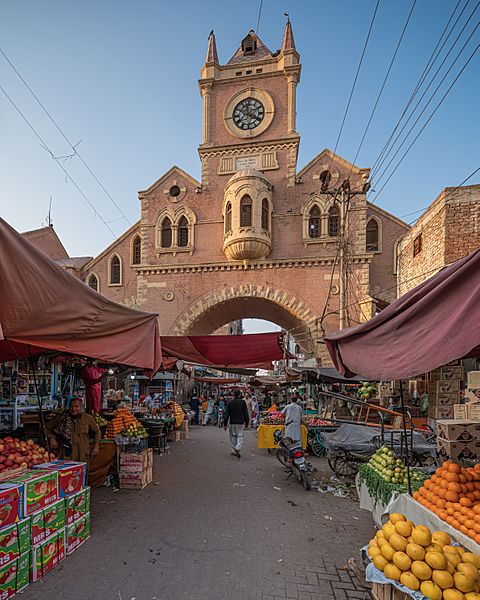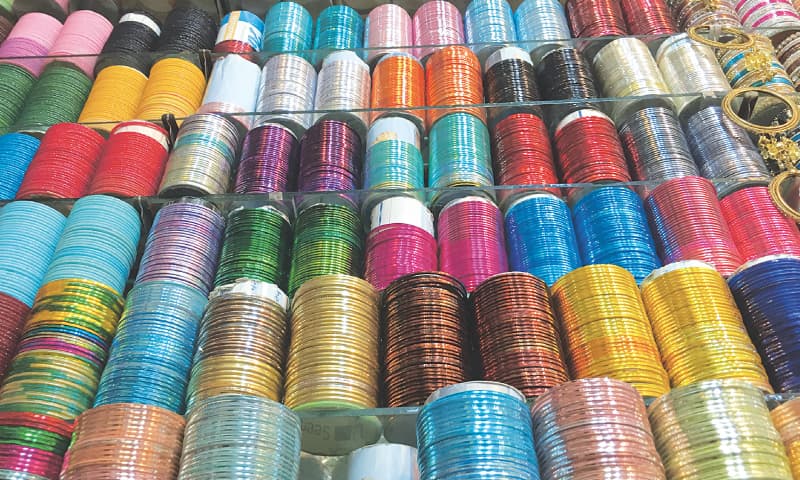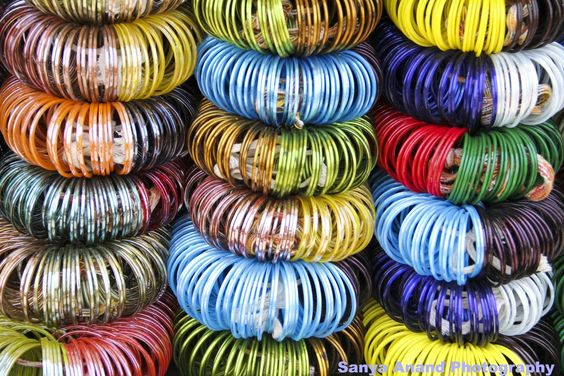
A legal document of Sindh High Court mentions that Jairamdas and his partners sold the Indus Glass Works under an agreement to Haji Fariduddin Siddiqui for Rs.100000/- on January 01, 1948.
By Nasir Aijaz
During college life in Hyderabad in early 1970s, I often passed near Indus Glass Factory for a short cut from my home in Latifabad to the city. The factory was located southeast of city beyond the main railway line, and I had to cross the famous Auto Bhan Road and walk through a deserted narrow metaled road with wild bushes, sewerage ponds and heaps of garbage on either side. This road would lead the people to reach the city center through the unmanned railway crossing.
Hyderabad, the historic and second largest city of Sindh province of Pakistan is known since long as the hub of glass bangle industry, where currently some 35 glass bangle units are functioning with employment of over three hundred thousand people, but I had no idea at that time how old this factory could be, neither had I tried to dig out its history.
 However, very recently, when I read some articles on Hyderabad’s glass bangle industry, which claimed that that the glass bangle factories were established here by the people who migrated from India during the partition in 1947, I started searching the history of glass industry in Hyderabad. When discussed one of my friends, he mentioned one Haji Farid Siddiqui as the founder of Indus Glass Works, whose sons used to be his schoolmates.
However, very recently, when I read some articles on Hyderabad’s glass bangle industry, which claimed that that the glass bangle factories were established here by the people who migrated from India during the partition in 1947, I started searching the history of glass industry in Hyderabad. When discussed one of my friends, he mentioned one Haji Farid Siddiqui as the founder of Indus Glass Works, whose sons used to be his schoolmates.
My search revealed that the glass factories in Hyderabad were established here even before creation of Pakistan by Sindhi investors hailing from Shikarpur Sindh, and, the Indus Glass Works was one of them. A pre-partition book mentions the brief history of this industry.
“Recently, some glass factories have been established,” writes Bherumal Maharchand Advani, a pre-partition historian, in his book “Sindh Je Hindun Ji Tareekh” (The History of Hindus of Sindh – page 132-133, new edition published 200). “The owners of Indus Glass Works are Shikarpuris, and are doing laudable work,” he writes.
Bherumal further writes, “The Hindu Sindhis had started establishing factories soon after the British rule in Sindh. Some of them had opened cotton ginning factories, Flour Mills, Rice Husking and other factories. Seth Udhaldas was the first who established textile factory in Shikarpur. It was initially handloom for weaving cloth which later was mechanized in 1908. The cloth weaving units were established in Rohri town, while some cloth weaving factories, biscuits and hosiery units were setup in Sukkur. Professor Shivaram Pherwani had established ice factory in Shikarpur while a matchbox manufacturing unit was established in Bubak town of Sehwan Taluka. There were several other industrial units in Karachi also.”
The search brought to fore an online copy of a legal document, which provided another proof that Indus Glass Works was established in Hyderabad by one Jairamdas and his partners. The legal document is regarding the litigation over a piece of land located near the Indus Glass Works.
 The document titled ‘Indus Glass Works Limited Versus Government of Sindh’, dated January 16, 1993, is a judgment by Justice Mukhtar Ahmed Junejo, High court of Sindh, Karachi (1993 MLD 856).
The document titled ‘Indus Glass Works Limited Versus Government of Sindh’, dated January 16, 1993, is a judgment by Justice Mukhtar Ahmed Junejo, High court of Sindh, Karachi (1993 MLD 856).
I will produce here some excerpts from that judgment:
“Petitioner Indus Glass Works Limited, which is a limited company incorporated under Company Law, 1913, has invoked Constitutional jurisdiction of this Court for declaring an order dated 24‑10‑1989, passed by the Member, Sindh Board of Revenue, to be illegal, void ab initio and of no legal consequence, and to have been passed without lawful authority. Petitioner also prayed that Hyderabad Municipal Corporation (respondent No.6) be restrained from disposing of, transferring, or alienating or in any manner treating the land in litigation as Katchi Abadi.
The judgment states, “M/s. Indus Glass Works a registered firm owned by Jaramdas (Jairamdas) and other partners, was running a glass factory situated in Survey Nos.160 and 161 of deh Nareji, which are adjacent to the property in litigation viz. 2‑34 acres of Survev No.162 of deh Nareji taluka City Hyderabad. Under an agreement of sale dated 21‑1‑1948 Jairamdas and his partners agreed to sell the firm M/s. Indus Glass Works to Haji Fariduddin Siddiqui for a sum of Rs.100000. Said agreement ‘was confirmed by the Deputy Settlement Commissioner, Hyderabad, under an order, dated 19‑1‑1955. For specific performance of said agreement, Fariduddin filed Suit No.6/55 in Court of the First Class Sub‑Judge Hyderabad. Said suit was decreed on 27‑4‑1955 in favor of Haji Fariduddin against the Evacuee owners and the Deputy Custodian Evacuee Property, Hyderabad. In pursuance of such decree a sale‑deed was executed on 9‑6‑1955 in favor of Haji Fariduddin by Official Receiver of Civil Court, Hyderabad and the same was duly registered. This was all in respect of factory of Indus Glass Works which was situated on land bearing S.Nos.164 and 161 of deh Nareji and which is not the property in dispute. Subsequently under a sale‑deed dated 1‑9‑1956, the concern known as Indus Glass Works with its immovable and movable property, was transferred for consideration to a limited company named as M/s. Indus Glass Works Limited viz. the petitioner.”
It further says, “While Indus Glass Works was owned by Evacuee owners Jairamdas anti others, they were given permission under a letter, dated 10‑5‑1950 issued by the City Mukhtiarkar Hyderabad, to occupy the property in litigation measuring 2 Acres 34 Ghuntas of S. No.162 of Deh Nareja on payment of certain amount as `Malkano’. It appears that Hindu owners of Indus Glass Works failed to pay the price for the disputed area and Haji Fariduddin, new purchaser of Indus Glass Works moved Collector of Hyderabad for the disputed area required by him for the extension of the factory of Indus Glass Works. On 27‑4‑1950 the Collector of Hyderabad granted the property in litigation to Indus Glass Works who deposited Rs.10345.50 as `Malkano’ in the Imperial Bank of India. Under a letter dated 28‑10‑1986 the City Mukhtiarkar, Hyderabad sought orders of the Additional Deputy Commissioner 1, Hyderabad for effecting mutation in favor of Indus Glass Industries Limited. Under an earlier letter, dated 16‑10‑1985 the City Mukhtiarkar, Hyderabad had intimated the Addl. Deputy Commissioner I, Hyderabad that 2‑34 acres of S.No.162 were permitted to be occupied by Indus Glass Factory, while remaining area was in possession of Burma‑Shell Companies and some Mohajirs. In same letter, the City Mukhtiarkar informed Addl. Deputy Commissioner I, that 2.34 acres of S.No.162 were sanctioned in favor of M/s. Glass Works but no entry was available in the record of rights.”
It’s pertinent to share entire document, which elaborates litigation over the land adjacent to Indus Glass Works for having a complete view of the situation. Click here for the judgment document.
It could not be ascertained whether the Indus Glass works’ owner Jairamdas and his partners migrated to India or they opted to stay in Sindh, or their descendants are still here or in India. This article might help me to contact their descendants.
_____________________
Writer is a senior journalist based in Karachi